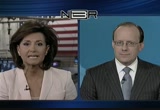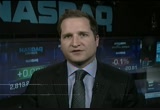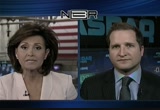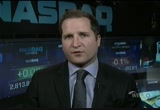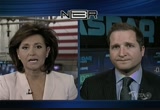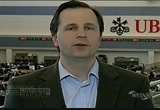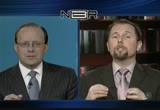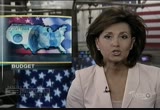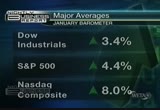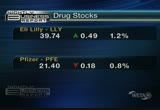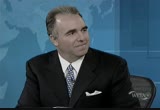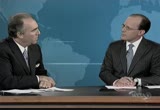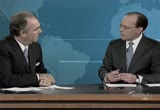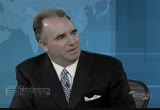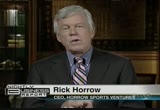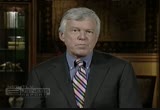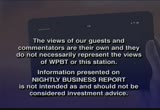tv Nightly Business Report PBS January 31, 2012 6:30pm-7:00pm EST
6:30 pm
>> the outlook for 2012 is a bit cautious. i don't think anybody is expecting to see a big boom this year. >> tom: with home prices stuck in the basement, the long- awaited recovery in the housing market is going to have to wait a little longer. >> susie: then, the kindle fire tablet reports scorching holiday sales, but amazon's outlook rctos the shares in after- hours trading. it's "nightly business report" for tuesday, january 31. this is "nightly business report" with susie gharib and tom hudson. "nightly business report" is made possible by:
6:31 pm
captioning sponsored by wpbt >> tom: good evening and thanks for joining us. a big drop in amazon earnings, and a big drop in the stock in after-hours trading. susie, amazon shares fell as much as 11% after the bell today as the company reported disappointing quarterly results. >> susie: tom, a lot of surprises. investors were surprised not only by those fourth quarter numbers, but a warning from amazon that it might lose money in the current quarter. let's run down the numbers. amazon earned 38 cents a share in the fourth quarter, down 57% from a year ago, but better than the 17 cents analysts were expecting. revenue rose 35% to $17.4 billion, but about a billion dollars less than estimates. the company did not give specific sales numbers for its kindle fire tablet, but it did say that holiday sales were up 177%.
6:32 pm
joining us now to talk more about those amazon results-- ken sena, director of research at evercore partners. hi, ken, nice to have you with us. >> thank you. >> susie: all rightuc so you've just gotten off of the analyst call with the company management. what did the management say about the earnings outlook and why they might lose money in in current quarter? >> well, i think it really comes down to how much investment that they're doing around to meet current need is what they kept coming back to again and again. if it they look at a strong growth in their electronics and other categories growing 50%-plus, they really feel they need to meet that need in terms of distribution. they're also not rolling out many product. and again and again, they came back to we're in growth mode, and we're going to be investing to meet that need. there wasn't a lot of specifics, though, as far as when you think about the distribution centers
6:33 pm
that they're creating. how many more are we talking? so you don't know when you look to the next quarter, you know, will it just be another repeat of this quarter where, you know, the company is making quite a bit but they're not putting up a lot of profit to show. >> susie: ken, i'd like to talk to you a little bit about kindle because amazon really has been pushing kindle, offering it at cut-rate pricees, less than half of the cheapest apple ipad, and they're willing to sacrifice profits for that growth strategy. do you get any sense from this call if they're going to stick with that strategy, and is amazon making the right choices here? >> i mean, i think certainly they're planning to stick with the strategy, and know-- as far as how they offer the kindle at a price point, yes, it doesn't make much money, but i think it's important for them to get the kindle in as many hands as possible to drive not just media products but ultimately to drive more sales on the amazon platform through that interface. so i think they're certainly committed to it. but i think from an investor's
6:34 pm
standpoint, i think there's trepidation there, given that they are competing with apexpel google, with much deeper war chestes, essentially, and, you know, already who have-- who already have, you know, a certain amount of control over the system. i think it's a big fight they'd actually be taking on. >> susie: let's talk a little bit about the stock. you have been recommending the stock. it was down 11% in after-hours. how do you feel about it tonight? after this analyst-- >> i think unlike google, when they reported, they were down a similar amount, you know, there were some positive-- positive elements within the report that i think were somewhat overlooked in the stock reaction. i think in this stock reaction it was a fair one. you know, the report was disappointing. it was soft on revenues -- >> susie: would you buy the stock at $1177? would you still recommend it at this price? >> i still do, and the reason is longer term i still feel very strongly that amazon is not just going into lower margin
6:35 pm
businesses, but ultimately they see their experience not just as a retailer but really as a platform to drive higher margins for businesses including advertising, vouchers, et cetera. not only do they have kind of a know-- you look at all the retail categories and traditional, you know, retail that they basically are-- continue to take share from. i think increasingly online they're continuing to potentially elbow google, e-bay, et cetera. >> susie: i have to jump in. i'm sorry. we'll have to leave it there. real quickly. any disclosures to make? do you own the stock? >> no, i do not. >> susie: thanks for being with us, ken. we appreciate your thoughts. >> thank you. appreciate it. >> susie: i've been speaking with ken sena-- good night to you-- director of research at evercore partners. >> tom: before we saw the results from amazon today, we saw a big retreat in consumer confidence this month. january's reading gave back some of the big gains it posted in
6:36 pm
december, falling to 61.1, down ember's reading near 65. the conference board's lynn franco says the major headwind consumers were facing in 2011 is likely to continue this year. >> jobs are key, and they're going to continue to be key. and until we have several months of strong sustainable growth that really convinces consumers that the recovery is underway, we're going to continue to see these lackluster levels. >> tom: stocks stumbled on that drop in consumer confidence. the dow lost 20 points, the nasdaq managed to gain almost two points, while the s&p fell a fraction. >> susie: fresh signs tonight that the troubles in the housing market are far from over. home prices nationwide fell for a third straight month in nearly all cities tracked by the standard and poor's case-shiller index. the lone bright spot was phoenix. erika miller takes a closer look at where prices are likely to head from here. >> reporter: this home in lyndhurst, new jersey, just came on the market. it joins an estimated seven and a half million homes currently for sale nationwide.
6:37 pm
experts say a healthy level is about two and half million. unfortunately for sellers, the outlook for the housing market is becoming more gloomy ahead of the key spring selling season. residential property values fell a steep 1.3% in november, according to the latest case- shiller report tracking 20 metropolitan areas. >> 1.3% over a month is really a rather large fall, and that's coming off two months of declines in both september and october. >> reporter: that's not the only bad news. home values around the country have fallen by a third since the housing market peaked in 2006. prices now stand at 2003 levels. home prices continue to suffer, despite historically low interest rates and improvement in employment. the big problem is the vast number of homes currently for sale. and another wave of foreclosures could further delay recovery in the sector. weak demand is another factor. >> we really haven't seen a
6:38 pm
turnaround in the economy. the job markets haven't picked up all that much, and there's a lot of lack of confidence in the market right now. >> reporter: and many people who do want to buy homes, can't because they don't qualify for financing. that's why many economists think 2012 will be a year of bouncing along the bottom. >> i think the state of the housing market can best be summed up be being in a state of stabilization. it is not likely to surge anytime soon. we are not likely to see a massive amount of home price appreciation. >> although home prices have probably, on a national basis, at least stopped going down, they are unlikely to go up by any material amount anytime in the near future. >> reporter: but others think 2013 is too optimistic for a widespread recovery in home prices. some skeptics don't expect a consistent rise in housing prices nationwide until 2015. erika miller, "nightly business report." >> tom: the erosion of home values is just one of the challenges millions of homeowners have when trying to refinance or modify their mortgages.
6:39 pm
turns out, while the government- owned mortgage company freddie mac was making it more difficult for homeowners to refinance into lower cost mortgages, it also was making financial trades that profit when homeowners stay in higher cost mortgages. the trades were uncovered by propublica and npr news. chris arnold of npr joins us. chris, welcome to "nbr." do you think it was a coordinated effort by freddie mac making it tough to refinance while profiting from higher interest rate mortgages? >> thanks, tom. well, i would not use the word "coordinated" necessarily. i mean, those two things you said were true. what our story showed was that on the one hand, freddie mac was making it harder for home owners to refinance their mortgages, making credit tighter. at the same time, the investment side of the company was going out into the market making leveraged bets that pay off if homeowners are unable to refinance. we were careful to say in the
6:40 pm
story we did not see any evidence that those two actions were coordinated, but they were going on. >> tom: right, and the trades we should point out, you also note, were legal. nothing illegal happened here. freddie mac, wasn't it just protecting its portfolio, like any other investor would do? >> right. these were not illegal trades. the difference here is that freddie mac is not another company. freddie mac is under government conservatorship because it has-- was taken over by the taxpayeres, basically. so the government is running this company, and the question we're raising with the story is, is it appropriate for a government-run cotpany to be making bets against homeowners being able to refinance, bets that run counter to that company's public apology mission? >> tom: so, chris, answer that question. what has freddie mac said about just that key question? >> well, freddie mac has said that they're not going to comment on the inner workings of its portfolios. so they referred us, basically,
6:41 pm
to their regulator, which did issue a statement yesterday that was interesting in some ways, if you want to talk about that. >> tom: yeah, we'll quick. give us the idea. this is the federal housing administration regulator of fannie mae and freddie mac, both in conservatorship. did it defend the portfolio trades? >> one thing as a reporter you look for, nothing in the statement said that we had gotten any facts wrong. you also look-- did we get the story right? >> tom: did not quibble with the analysis. >> did not quibble with any of the facts in the story. i believe they were trying to say, look, we have a huge portfolio, hundreds of billions of dollars. these trades were only several billion dollars. but we're talking about $3.5 billion worth of trades tied to $20 billion worth of mortgages that involved tens of thousands of real homes and real homeowners. their statement actually came out and said it was 20%, 30% more than that even. it seems like a lot of numbers.
6:42 pm
>> tom: it certainly is. there's a homeowner behind every one of those mortgages and a family. chris arnold with "nbr" tonight investigating freddie mac. >> susie: still ahead-- from the housing crisis to jobs, the republican presidential primary race heads to the sunshine state. we hear from a florida c.e.o. about what he wants from washington. if the nation keeps doing what it has done in the past-- extending tax breaks and putting off spending cuts-- the deficits, over the next decade, will top $11 trillion. that's the sobering update from the congressional budget office. and as darren gersh reports, the deficit dilemma is an increasingly tight fit. >> reporter: if we cut the deficit right away-- eliminating the bush tax cuts and slashing defense and other spending-- the deficit will drop dramatically, but the economy will stall out. >> taken together, these policies will generate a sharp fiscal contraction. >> reporter: if we wait to cut the deficit, that will boost the
6:43 pm
economy in the next few years, but as more baby boomers retire, the cost of social security, medicare, and other health care spending will almost double over the next ten years as a share of our economy. and that could send the national debt skyrocketing to more than $23 trillion. >> the longer that we wait, as a country, to make the sort of choices that we have to make, the harder it will be to make them because more debt will have accumulated. >> reporter: most budget wonks agree we should keep growing the economy now, but make cuts in the medium to long run, a policy that sounds good on paper, but has been hard to put into action politically. darren gersh, "nightly business report," washington. >> tom: the market ended with a bit of a whimper for socks. it was a strong month overall for shareholders. let's get to it with tonight's market focus. january ended with a whimper in the stock market, but it was a
6:44 pm
strong month for shareholders. here's how the day played out for the s&p 500. after some opening bell buying, stock prices fell after the disappointing drop in consumer confidence. the index was able to repair itself somewhat, closing with a small loss. but the s&p 500 is more than 4% higher tonight than it was at the beginning of the month. it's the best january since 1997. and of course, that kind of rally brings to mind the january barometer, which is the idea that the direction of stock prices in the first month of the year sets the pattern for the entire year. and it has been a strong start. the dow industrial index is up 3.4%. the official number of the s&p 500 is up 4.4%. the best has been the nasdaq, up 8% this month. but it was the energy sector that hurt market performance today. among those weighing on the sector was exxon mobil. while the oil giant was able to report earnings one penny better than expectations, it produced less oil and natural gas than expected.
6:45 pm
warm winter weather may have hurt natural gas demand, but analysts expressed concern about a combination of the drop in production and an increase in spending. exxon's 2% drop was the biggest among dow industrial stocks. volume almost doubled as the stock now sits at a seven-week low. we have more analysis of exxon's stock chart on the blogs sector at our web site, nbr.com. a couple of big drug makers saw their stocks move in opposite directions today after reporting earnings. eli lilly shares rallied more than 1% over strong volume. while pfizer fell to a six-week low. here are those pfizer results-- three cents better than anticipated, but it trimmed its 2012 forecast because of a strengthening dollar. pfizer also saw its cholesterol fighting blockbuster lipitor come off patent late last year. eli lilly also saw a drug lose patent protection last quarter-- its anti-psychotic medicine. while earnings fell from a year ago, they were stronger than forecast.
6:46 pm
as we mentioned last night, radio shack looked to be a big loser today after warning its fourth-quarter performance will come up way short, and we saw the stock damage today. shares plunged, losing a third of their value, falling to a new 52-week low. volume was more than 20 times normal. the retailer blames a big drop in its sprint business for the shortfall. and it also suspended its stock buyback plan, adding to the selling pressure. and that's tonight's "market focus."
6:47 pm
>> tom: it's the biggest contest yet for republicans vying for the white house. florida's republican primary is winner take all, getting all the delegates at stake. while the economy is the top issue everywhere, today's voting comes in a state with a higher unemployment rate than the nation and one of the most damaged housing markets. maurice ferre is the c.e.o. of medical technology firm mako surgical based in fort lauderdale, florida. he joins us here in miami. nice to see you here. >> thank you, tom. thank you for inviting us. >> tom: what does your business tell you about florida's economy and the nation's economy? >> it's all about sustainable jobs. in this economy, we have to become business friendly. we have to create the opportunities to allow us to be number one and let us do our jobs, the entrepreneurs. >> tom: are you hearing those opportunities here in florida, ahead of the primary? >> you know, it's tough because this is a very tough environment.
6:48 pm
you know, we're trying to create jobs. we committed to creating 100 new jobs here in the state of florida, but we deal with a lot of people that are high educated, and we have to deal with issues like visas and immigration. >> tom: i want to ask you about hiring before we get into some of the regulations you see stymieing your growth. advanced manufacturing is what you do with really high-end medical products. are you finding the skilled labor available in this market with almost a 10% unemployment rate in florida? >> being one of the fastest growing companies here in north america, it's tough finding the right people to get these jobs. we're working hard at this. >> tom: what would immigration specific targeted vis as do to your hiring prospects? >> we spent so much time and energy looking for the talent, and a lot of the talent we need are ph.d.-type talents. that's what we need across this nation. and it's very difficult to find
6:49 pm
those types of people. we need to open up immigration. >> tom: how much more open would you like it, for instance? >> well, you know, i think it's going to be driven in terms of technology innovation for us to get out of these cycles. we have to reinvent ourselveses and reinventing ourselves requires innovations and it comes out of these universities. >> tom: you also operate in health care, one of the most regulated and highly politically charged sectors, given this election, no doubt. we hear from c.e.o.s across industries about regulation, hurting growth, holding back growth. do you agree? >> i do. we are a $350 billion industry, and you look at-- we get two million jobs in the device industry here in the united states, and we have to become more friendly to industry. you know, we have an excise tax coming in 2013. i hear a lot of my peers talking about moving jobs to other nations, other countries, because of dealing with those excite taxes.
6:50 pm
we have f.d.a. regulations that are taking four years long tore get things through the f.d.a. >> tom: you come from a political family. your farther was the mayor of miami, ran as a democrat for the u.s. senate. what about the quality of political decision around the income disparity, the 1% versus the 99%. is that harmful? >> i hear about that and i heard somebody tell me, of the 1%, 80% used to be part of the 99%. that's free enterprise. we have to create those environments so that people can grow ask people can live prosperously. >> tom: maurice ferre, c.e.o. of mako surgical. >> susie: here's what we're watching for tomorrow: we talk with volkswagen usa president jonathan browning as the nation's auto makers report january sales numbers. also tomorrow, payroll processing firm adp reports january jobs numbers. and hilary kramer returns as our "street critique" guest.
6:51 pm
there's still time to email your questions to streetcritique@nbr.com. new claims tonight that china's trade practices are killing jobs in the u.s. auto sector. three reports released today by the alliance for american manufacturing claim over a million and a half jobs in the u.s. auto parts industry are at risk. the reason-- china offers auto parts makers illegal subsidies, rigs its tax laws and manipulates its currency. combined, these assaults have allegedly cost more than 400,000 u.s. jobs since the year 2000. >> tom: apple headed across the pond to find its new top retail executive. c.e.o. tim cook has tapped john browett for the job. browett ran britain's second largest electronics retailer. now, he'll be in charge of developing apple's retail strategy as the maker of iphones and ipads expands its stores around the globe. browett will be on the job come april, reporting directly to the
6:52 pm
6:53 pm
>> at the world economic forum in davos last week, the big buzz surrounded sightings of mick jagger of the rolling stones. but as i walked around the snowy streets, another '60s era icon kept coming to mind-- bob dylan. for the times, they are a changing. davos was created as a joint european-american project to help the poor developing world escape its political, economic, and social woes. but as dylan sang, the first now shall later be last. this year, there was comparatively little discussion about the woes of those who live on $2 a day. in fact, the rampant growth and rise of brazil, india, and china is now taken as a given. no, the real concern was with the rich countries... or formerly rich countries. how could europe stay together while greece struggles to pay its debts? why did the u.k. plunge itself back into recession? will washington's dysfunction torpedo a global recovery? the big question looming over davos 2012 was whether the rich and powerful could manage their affairs with any skill and competence. as the gathering dispersed, the
6:54 pm
question remained very much an open one. in davos, where a hard snow was falling, you don't need a weatherman to know which way the wind blows. i'm daniel gross. >> tom: and finally tonight, the super bowl is more than just a football game; it's the most expensive advertising time there is. with millions of dollars at spent, tonight's "beyond the scoreboard" looks at whether its money well spent for shareholders. here's rick horrow. >> reporter: with more than 100 million people expected to watch live, the super bowl preseedinai incredible opportunity for marketers. with that opportunity, however, comes a cost. this year, 30-second commercials in the game averaged $3.5 million, with some spots reaching as hi ty the multimillion-dollar question is, are the ads worth it? from a stock market perspective, the answer is yes. according to a study by the university of wisconsin-eau claire, super bowl advertisers from 1996 to 2010 outperformed the s&p 500 by more than 1% on average in the week before and
6:55 pm
after the game. the boost in share price is attributed to the hype associated with advertising in the super bowl. the longer a company hyped their ad during the year, the longer they outperformed the market. public companies advertising in this year's game include best buy, coca-cola and gm. nevertheless, given how critical fans are of the ads, corporations need to make sure they can afford to fall flat. $4 million for 30 seconds is more than some company's entire ad budgets. one of the most prominent examples of a super bowl ad gone bad was just for feet. the shoe retailer aired a racially insensitive ad during the 1999 game and filed for bankruptcy by the end of the same year. the moral of the story? advertiser beware! >> susie: that's "nightly business report" for tuesday, january 31. i'm susie gharib. good night, everyone, and good night to you, too, tom.
6:56 pm
217 Views
IN COLLECTIONS
WETA (PBS) Television Archive
Television Archive  Television Archive News Search Service
Television Archive News Search Service 
Uploaded by TV Archive on

 Live Music Archive
Live Music Archive Librivox Free Audio
Librivox Free Audio Metropolitan Museum
Metropolitan Museum Cleveland Museum of Art
Cleveland Museum of Art Internet Arcade
Internet Arcade Console Living Room
Console Living Room Books to Borrow
Books to Borrow Open Library
Open Library TV News
TV News Understanding 9/11
Understanding 9/11
